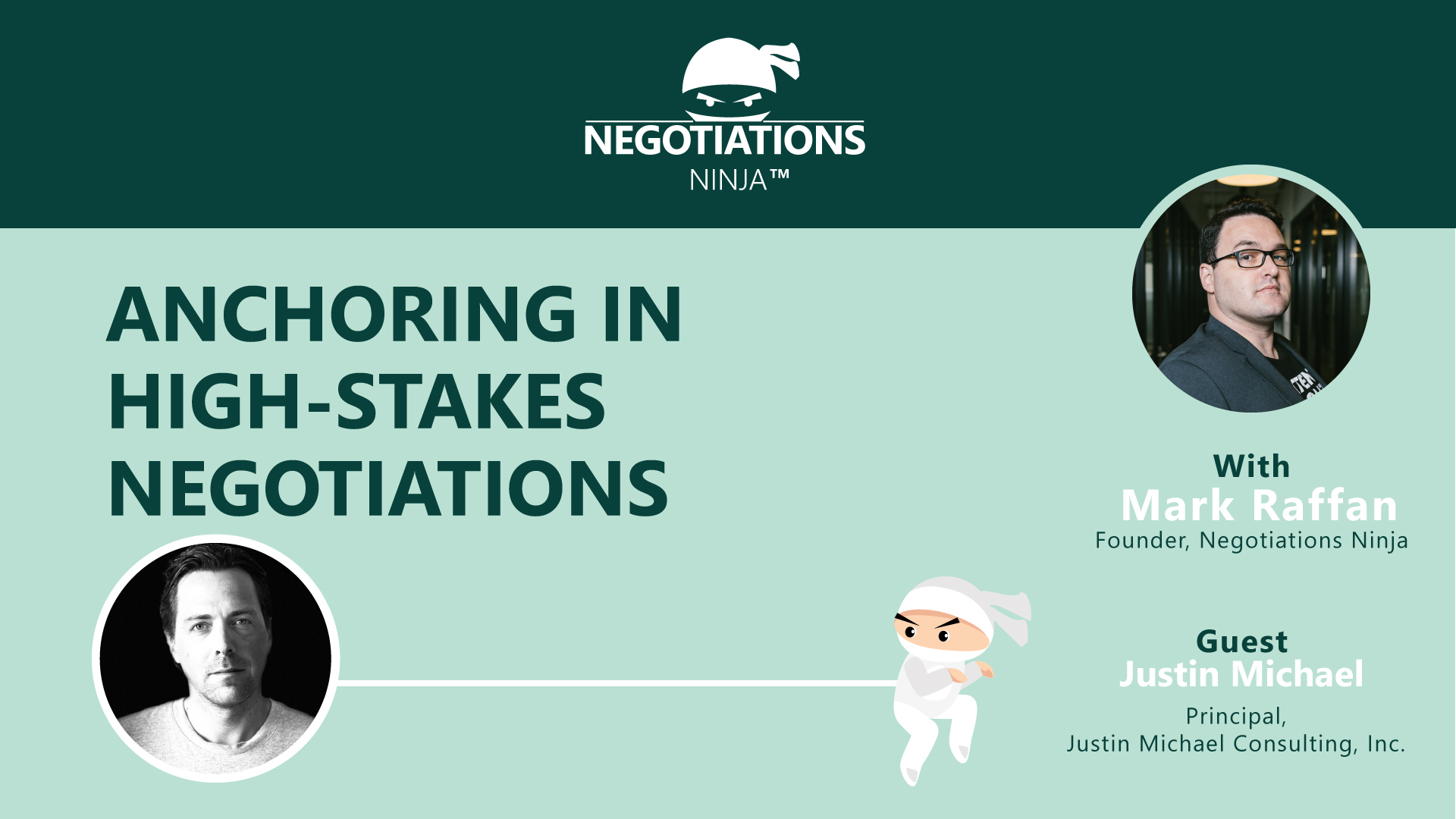Why should you utilize anchoring? How do you anchor a deal? How early in the negotiation should you do it? After 20+ years in sales—and extensive research on neurolinguistic science, Natural Language Programming (NLP), game theory, social dynamics, behavioral psychology, and anything to do with human behavior—Justin Michael has a handle on anchoring. He shares the lessons he learned from closing high-stakes deals in this episode of Negotiations Ninja.
Outline of This Episode
- [2:20] Learn more about Justin Michael
- [6:10] Anchoring in negotiation
- [9:49] Can you anchor too high?
- [15:03] Is it a matter of confidence?
- [16:33] How to persuade a C-level individual
- [19:19] Sales is the transference of belief
- [22:30] People buy emotionally and rationalize with logic
- [27:24] Be selective about your clients
- [30:29] Learn more about Justin’s new book
Anchoring in negotiation
If you’re not familiar with anchoring, it’s the psychological predisposition for us to react to (or anchor to) the first number/figure that we’ve been given. If we’re negotiating and Justin offers a proposal at x price, he’s anchored my mind to that number.
I’m reacting to that anchor versus thinking about what I’d planned for the negotiation. It gives him the upper hand in managing my mindset. It’s easier to lower a cost versus “beg” for more.
Research shows that you want to anchor at the full price of what you offer and paint the picture of the full deployment. Then you pull back with limited concessions from that number versus offering a pilot price and having to come up from it.
Can you anchor too high?
People want to be assured that they’re going to get a return on their investment. You have to be confident in your ROI. Every procurement leader knows how to look at millions of dollars. You might be nervous pitching a million-dollar deal, but procurement won’t bat an eye. They’re used to large sums. So anchor at your full price, whatever it may be, and negotiate from there.
The majority of Fortune 500 clients spend between $250,000 and $1.25 million per year when they’re shown that they will have a 3–7x return. They don’t quibble over starting prices because they know the value of what they’re buying.
Is it a matter of confidence?
Too many decisions are lost to indecision because salespeople aren’t guiding buyers through the process. You must have the confidence to say, ‘This is the way it has to be” and “This is how you will get a return on your investment.” If you lack confidence, your counterparty sees right through you. If you waffle, the sales become challenging, especially when negotiating with a C-level person.
How to persuade a C-level individual
The key in a first negotiation is to take water or coffee that’s offered because it builds reciprocity. In an important meeting, Justin accepted a cup of coffee and immediately spilled it all over his white shirt. He sat through that entire meeting with a coffee stain on his shirt. He let them talk and simply listened. It’s the listening—not the talking—that lets them convince themselves. It’s also about the quality of your questions. Asking the right questions will show your knowledge and expertise and make them confident that you know what you’re talking about. Listen to episode #431 to learn more about anchoring and negotiating with the C-suite.
Resources & People Mentioned
- Tech-Powered Sales: Achieve Superhuman Sales Skills
- Sales Superpowers: A New Outbound Operating System To Drive Explosive Pipeline Growth
- Justin Michael Method 2.0
- The JOLT Effect
Connect with Justin Michael
Connect With Mark
- Follow Negotiations Ninja on Twitter: @NegotiationPod
- Connect with Mark on LinkedIn
- Follow Negotiations Ninja on LinkedIn
- Connect on Instagram: @NegotiationPod




